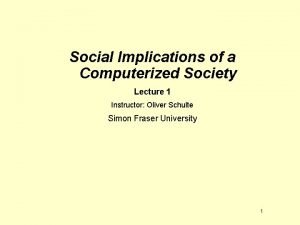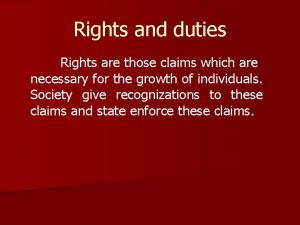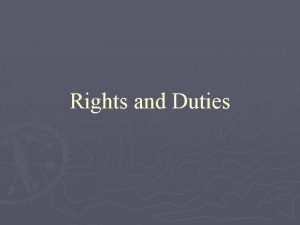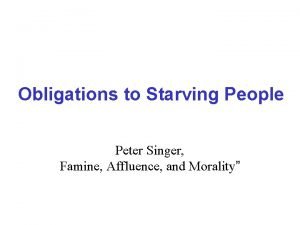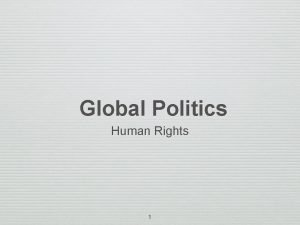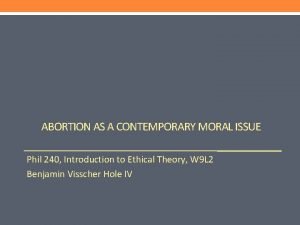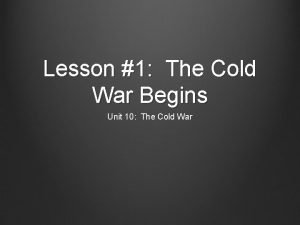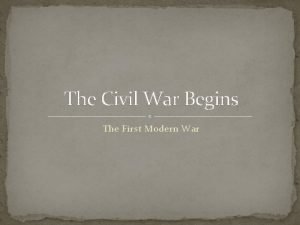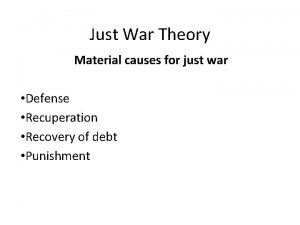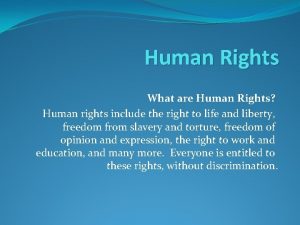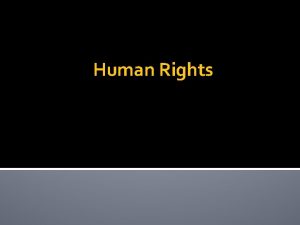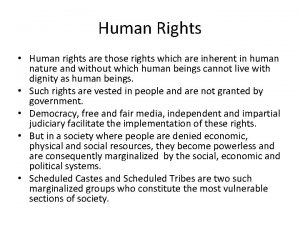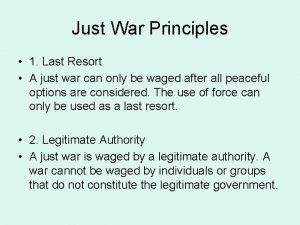HUMAN RIGHTS Just War Theory HUMAN RIGHTS The







































- Slides: 39

HUMAN RIGHTS Just War Theory

HUMAN RIGHTS The Justice of War (Jus ad Bellum) + Justice in War (Jus in Bello)

HUMAN RIGHTS International Law I The Transition from an Order of Custom to a System of Law

HUMAN RIGHTS The Transition from Orders of Custom to the Rule of Law from Families, Tribes, and Clans to States

HUMAN RIGHTS Was It a Smooth Transition? M. L. Walker: "ʺThe substitution of the deme for the clan meant in effect the transition from a principle of kinship to that of locality. Athens after the reforms of Cleisthenes was no longer a federation of kindreds. "ʺ Cambridge Ancient History

HUMAN RIGHTS R. J. Bonner: "The rites families paid to the dead, like the loyalty to the family, seem to have been regarded with a hostile eye by the polis at a certain stage of Athenian development. The legislation by Solon against undue expenditure on funerals was a political measure directed against the influence of the great aristocratic families. It hindered the cult of the grave in which the populace could not participate. "

HUMAN RIGHTS Replacing the Old Order of the Family with New Order of the City-State. Aristotle: “The private rites of families should be converted into public ones; in short every means should be adopted which will mix the citizens one with another and get rid of the old connections. ” Politics 1319

HUMAN RIGHTS From A Hierarchy of Deference and Authority to the Appearance of Individuals cut loose from their social moorings without a home or social place. • Henry Maine: “As the state develops the individual is steadily substituted for the family as the unit of which the civil law takes account. ” • Jehrings: “The progress of law consists of the destruction of every natural tie in a continual process of isolation and separation. "ʺ

HUMAN RIGHTS Antigone: “A brother is a friend forever. ”

HUMAN RIGHTS What is a State? Max Weber: ʺ[A state is that entity which has] a monopoly on the legitimate use of force within a given territory. ”

HUMAN RIGHTS State Formation: from Custom to Law? Order of Custom Rule of Law unwritten inefficient irrational vague clear difficult to change repealable personal impersonal particular universal uncertain predictable

HUMAN RIGHTS State Formation (from custom to law? ) The Principle of Double Institutionalization Two Caveats or Concerns: (1) Customs and Duties to Others v. Duties and Customs as a State Tax (2) Three New Functions: Census, Conscription, Taxation

HUMAN RIGHTS Again: Was the Transition from Custom to Law, Family to State, Smooth? Was It a Process of Rationalization or Struggle? A Process of Progress and Improvement or Disruption?

HUMAN RIGHTS State Formation: from Families to States Family State blood tie civil tie birth (kinship) territory tribe, clan citizens order of custom rule of law virtue: courage virtue: reason, persuasion philos (blood relative) philos (friend) Gods below (in Hades) Gods above (Zeus) Antigone Creon female male

HUMAN RIGHTS The City-State of Athens Aeschylus’s “ Oresteia” and Sophocles’s “Antigone” Vietnam, Lyndon Johnson and the Bombing of Hanoi (“How Are My Boys? ”) Iraq: Sunnis, Shiites and Kurds Syria

HUMAN RIGHTS A Nation-State? What is a Nation-State? Families, Tribes, Clans, Ethnic Groups and Citizens

HUMAN RIGHTS There’s an old Bedouin Proverb: “My brother and I are against my cousin. My cousin and I are against the whole world. ” It captures the human condition far better than Thomas Hobbes’s “man is wolf to man. ”

HUMAN RIGHTS It is generally thought that a commitment to human rights is caught in the tension between morality and politics. The “Problem of Dirty Hands” puts the Prince in just such a bind, torn, as he can be, between being good and doing what’s best for the members of the community over which he presides, between being moral and being politic.

HUMAN RIGHTS But the dilemmas faced by the leaders of states who wish to respect the human rights of those who live outside their borders or those, within their midst, who do not have the status of full citizenship is not captured by the distinction between morality and politics, but by the distinction between ethics and morality and the distinction between thick and thin relations.

HUMAN RIGHTS The Bedouin proverb makes sense in a world of thick relations. It expresses a view of human life that it is not inappropriate to call “tribalism” and it maintains itself in the solidarity of its members coupled with an indifference and at times hostility its members show to the rest of the world.

HUMAN RIGHTS Citizenship Begins with Membership in a Political Community Minority Rights v. Human Rights Canada, the U. S. , France, the Netherlands, Denmark, Tibet, India, China, Egypt, Syria

HUMAN RIGHTS Traditional Authority v. Common Sense Galileo (1564 -1642)

HUMAN RIGHTS Trust Your Experience Francis Bacon (1561 -1626)

HUMAN RIGHTS The Origins of Private Life Erasmus (1466 -1536}

HUMAN RIGHTS From Bench to Chair Shakespeare (1564 -1616)

HUMAN RIGHTS The First Right: The Fourth Amendment John Wilkes (1725 -1797)

HUMAN RIGHTS Natural Rights John Locke (1632 -1704)

HUMAN RIGHTS Freedom and Human Dignity Immanuel Kant (1724 -1804)

HUMAN RIGHTS On Liberty and Rights John Stuart Mill (1806 -73)

HUMAN RIGHTS The Declarations in America and France The Declaration of Independence (1776) The Declaration of the Rights of Man and Citizen (1889)

HUMAN RIGHTS The Constitution (1787) and the Bill of Rights (1791) Democracy and the Rights of Minorities Slavery Abolished (1865) and Race Women’s Suffrage (1920) Voting Rights

HUMAN RIGHTS THREE DECLARATIONS: 1776, 1789, 1948 The Declaration of Independence The Declaration of the Rights of Man and Citizen Universal Declaration of Human Rights

Churchill’s Decision To Bomb the German Cities After the raid on Coventry in November of 1940: “Bomber Command was instructed simply to aim for the center of a city. ” What was once “indiscriminate, ” was now “required. ”

1942: Lord Cherwell’s “Minute” By early 1942 aiming at military targets within cities was barred: “The aiming points [were] to be the built-up areas, not, for instance, the dockyards oo the factories. ” • (Lord Cherwell’s Minute)

What Was the Law? • International understandings and convention prohibited such action at the time: The International Commission of Jurists in the Hague in the 1920’s put the matter succinctly: “Aerial bombardment destined to terrorize the civilian population, or to destroy or damage private property which has no military character, or to wound noncombatants, is prohibited. ”

Was Churchill’s Decision Justified? • A number of reasons for the bombing were given: The attacks on the German cities were justified (1) as reprisals for the German blitz, (2) to weaken and/or destroy civilian morale on the ground, and (3) as the only means available to the British at that time to stop Hitler (Churchill: “The bombers alone provide the means to victory. ”)

Walzer’s Calculus • The question arises: “Should this determinate crime be wagered against this immeasurable evil? ” • (Walzer, Just and Unjust Wars) • Yes or no?

Means of Last Resort • And then, too, if “there is some other way of avoiding the evil, or even a reasonable chance of another way, [one] must wager differently. . . that is why it is so easy to condemn the attack on Dresden in 1945. ” (Walzer, again)

Justification v. Excuse • Means v. Ends • • Sentencing v. Punishment • • Undermine v. Override the Moral Status the Wrong of a Direct Attack Upon the Civilian Population
 Just war theory
Just war theory Just war theory
Just war theory Rewrite the final six lines of romeo and juliet
Rewrite the final six lines of romeo and juliet Human rights theory
Human rights theory Positive vs negative rights
Positive vs negative rights Riparian and littoral rights
Riparian and littoral rights Conclusion of rights
Conclusion of rights Legal rights and moral rights
Legal rights and moral rights What are negative rights
What are negative rights Negative rights
Negative rights Negative right
Negative right Negative right
Negative right War at home vs war abroad madison
War at home vs war abroad madison Korean war vietnam war venn diagram
Korean war vietnam war venn diagram The cold war lesson 1
The cold war lesson 1 Truman doctrine and marshall plan venn diagram
Truman doctrine and marshall plan venn diagram Josette dugas war of 1812
Josette dugas war of 1812 Ich war, du warst
Ich war, du warst Tug of war or tug-of-war
Tug of war or tug-of-war Why was the civil war considered the first modern war
Why was the civil war considered the first modern war Simple past bringen
Simple past bringen Toward civil war lesson 3 secession and war
Toward civil war lesson 3 secession and war Proxy war cold war definition
Proxy war cold war definition Chapter 30 the war to end war
Chapter 30 the war to end war Chapter 30 the war to end war
Chapter 30 the war to end war Hát kết hợp bộ gõ cơ thể
Hát kết hợp bộ gõ cơ thể Ng-html
Ng-html Bổ thể
Bổ thể Tỉ lệ cơ thể trẻ em
Tỉ lệ cơ thể trẻ em Voi kéo gỗ như thế nào
Voi kéo gỗ như thế nào Thang điểm glasgow
Thang điểm glasgow Alleluia hat len nguoi oi
Alleluia hat len nguoi oi Môn thể thao bắt đầu bằng chữ f
Môn thể thao bắt đầu bằng chữ f Thế nào là hệ số cao nhất
Thế nào là hệ số cao nhất Các châu lục và đại dương trên thế giới
Các châu lục và đại dương trên thế giới Công thức tiính động năng
Công thức tiính động năng Trời xanh đây là của chúng ta thể thơ
Trời xanh đây là của chúng ta thể thơ Mật thư anh em như thể tay chân
Mật thư anh em như thể tay chân Làm thế nào để 102-1=99
Làm thế nào để 102-1=99 Phản ứng thế ankan
Phản ứng thế ankan




